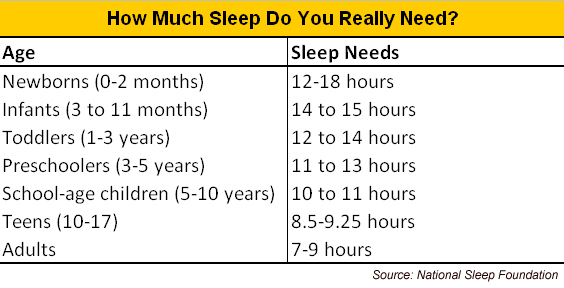What’s the “Right” Amount of Sleep
Bethaney Wallace on 30th Sep 2013
Have you ever stopped to wonder how much sleep is “enough?” We often feel we’ve gotten too little, or even too much, but there are very few nights we wake up feeling that perfect level of rested – while still energetic and perky in the morning. Instead we wake up tired, longing to turn back the alarm an extra hour. Yet, very rarely are we able to drift back into a deep sleep, whether thwarted by time or the inability to sleep. So how do you know which ratio of rest is the right one?
As children, we need much more sleep than in our adult lives. Because bodies are growing on a daily basis, including the brain, which is the organ that needs the most rest, they need far more sleep than their older counterparts. This continues into teenage years, as bodies are still developing and kids are extremely active. But somewhere down the line – oftentimes in college – the sleep level takes a serious downturn. From late night studying, working, or socializing, the body learns to function with far less sleep. Then, as we get older, the habits seem to stick. While there may be earlier nights, there are also earlier mornings.
How Much Sleep is “Enough”?
It has long been said that each person “needs” more sleep than others. While one might stick to only four-six hours each night, another might need closer to eight or nine, more when outside circumstances play a part. For instance, being sick or needing to get “caught up” after a late night, can also adjust one’s sleeping schedule. However, it can also be argued that these differences come from level of activity or even their ability to function in a tired state.
According to the National Sleep Foundation, adults need anywhere between seven and nine hours per night. That’s far more than a majority of adults receive on a consistent basis. And the younger the age, the higher the hours of needed sleep becomes. Including:

The Foundation also points out that it’s impossible to customize an exact amount of hours for each age. Rather, these numbers are compiled to best take into account growing needs, as well as the proper amount of rest for one’s body and brain each night. Therefore, if one adult sleeps only six hours, but another sleeps nine and a half each night, this is perfectly normal. It’s also likely for numbers to decrease as one ages. Studies have shown that older sleepers have a harder time gaining restful sleep once reaching the early morning.
However, one should also consider naps, which are taken by babies and young children (and those of all ages). This type of rest also counts toward a daily rest quota, even if it provides the body with different levels of sleep.
Finally, it’s important for individuals to take their lifestyles into account. Those that work extremely physical jobs or long hours (such as 12-hour or doubles) might need more sleep. In contrast, those who work at a desk and rarely exercise might need less sleep. Then again, stress levels, personal responsibilities, and more, also contribute to how tired a person will become. In short, the above outlines recommended levels, but overall it’s a personal choice; no one should force sleep when it can’t be had. Rather, take to resting when it feels right. [Sleep Foundation]
Whether looking to sleep a solid eight hours each night, or checking to see what type of development is best for a growing body, it seems there’s a right amount of sleep for every age – in theory at least. Consider these numbers the next time you’re looking to catch up on rest.
